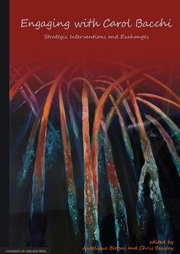Book contents
- Frontmatter
- Contents
- Acknowledgements
- List of Contributors
- Introduction
- Part I Looking back: On beginning
- Part II Strategic interventions and exchanges: Reflections and applications of the ‘What's the Problem Represented to be?’ approach
- Part III Strategic exchanges: The wider context
- 8 Making politics fleshly: The ethic of social flesh
- 9 Post-structural comparative politics: Acknowledging the political effects of research
- Part IV Looking forward: Still engaged
9 - Post-structural comparative politics: Acknowledging the political effects of research
from Part III - Strategic exchanges: The wider context
Published online by Cambridge University Press: 05 June 2013
- Frontmatter
- Contents
- Acknowledgements
- List of Contributors
- Introduction
- Part I Looking back: On beginning
- Part II Strategic interventions and exchanges: Reflections and applications of the ‘What's the Problem Represented to be?’ approach
- Part III Strategic exchanges: The wider context
- 8 Making politics fleshly: The ethic of social flesh
- 9 Post-structural comparative politics: Acknowledging the political effects of research
- Part IV Looking forward: Still engaged
Summary
Methodology—theorising on the methods we use when doing research—is a central but quite often neglected dimension in research. The acknowledgement of and interest in the methodological dimension of research differs, both between and within different disciplines and fields of study. For example, I would argue that discussions and debates on methodology have been more prominent in feminist studies compared to my other ‘home’ in the academy—political science. Being a feminist scholar interested in comparative politics I have been struck by the difficulties of trying to do comparative analysis differently, differently in terms of challenging the prevailing positivistic paradigm where ‘the world’ is seen as already there and instead promoting a post-structuralist position where ‘reality’ is regarded as only understandable through the constitutive lens of the research process.
These challenges have made me question the methodological dimension of research on politics, and especially on comparative politics. They have also brought me to the point of departure of this chapter-that is, methodologies matter and have political implications. I am specifically concerned with considering what a failure to recognise the political significance of methodologies means for feminist research and the potential of feminist research to be transformative.
The chapter is structured in three parts. The first part explains why and how methodology matters politically and situates this understanding of methodology as political in established feminist criticism. The second part of the chapter demonstrates the absence of attention to critical and political questions of methodology in existing comparative studies and feminist comparative studies more specifically.
- Type
- Chapter
- Information
- Engaging with Carol BacchiStrategic Interventions and Exchanges, pp. 121 - 138Publisher: The University of Adelaide PressPrint publication year: 2012
- 5
- Cited by



